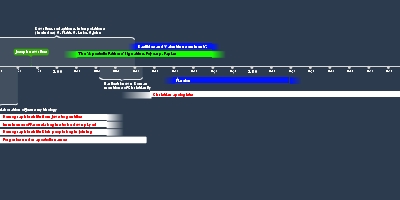Initial emergence of institutionalized Christianity | Jewish-Christians? | Gnostics? (jan 1, 80 – dec 31, 149)
Description:
The term “Christian” begins to be used by Jesus cultists about Jesus cultists.The Jesus club(s) in Rome exert influence over other clubs in the eastern Mediterranean for the purposes of exhortation, instruction, and intervening in local disputes. This may not have been popular with everyone.
Jesus clubs begin to be led by a more clearly defined leadership class, beginning with “elders” (presbyters), with the roles of “bishop” and “deacon” also growing in importance and institutionalized character over time. The letters of Ignatius in particular showcase an extreme focus on the institutional authority of the bishop, deacons, and presbyters. The manuscript tradition vests divine power and authority with this leadership class and with the emerging institutional church. There are faint glimpses of potential anti-institutional pushback as well, as well as cases of open rebellion against the leadership of a Jesus club and apparent embezzlement of common funds.
The pastoral epistles (1 Timothy, 2 Timothy, Titus) are forged in Paul's name during the post-apostolic age of growing institutionalism.
They act as a corrective to some of Paul's now more-controversial ideas (preference for sexual asceticism, promotion of women in leadership roles). They also attest to some interesting realities of the era:
> A pair of pre-Pastoral creeds attest to the ongoing use of low or unorthodox Christologies (Jesus as a human being; his resurrection “in spirit” witnessed by “angels”).
> Pushback on a broad assortment of post-Pauline doctrines and narratives, some of which may well be referring to content in the canonical New Testament: realized eschatology, “profane myths”, “Jewish myths”, speculative (Davidic?) genealogies.
> Christians in Ephesus and Asia targeted specifically as having deviated in doctrine or broadly turned away from Paul
> Reference to continued conflict with Judaizers?
> 1 Timothy later interpolated to address Marcionite gnosticism?
Despite the growing influence of the Roman Jesus club(s) and the emergence of bishops as club leaders, there are actually multiple prongs of evidence against the idea of a solitary bishop over Rome, which would undermine the later Catholic claim of an unbroken bishopric dating back to Peter.
There are efforts to close the doctrine and reign in individual interpretations of prophetic content, probably a testament to how doctrinally diverse and charismatic early Christianity really was.
Emergence of Christian liturgical and homiletic traditions.
Added to timeline:
Date:
jan 1, 80
dec 31, 149
~ 70 years
